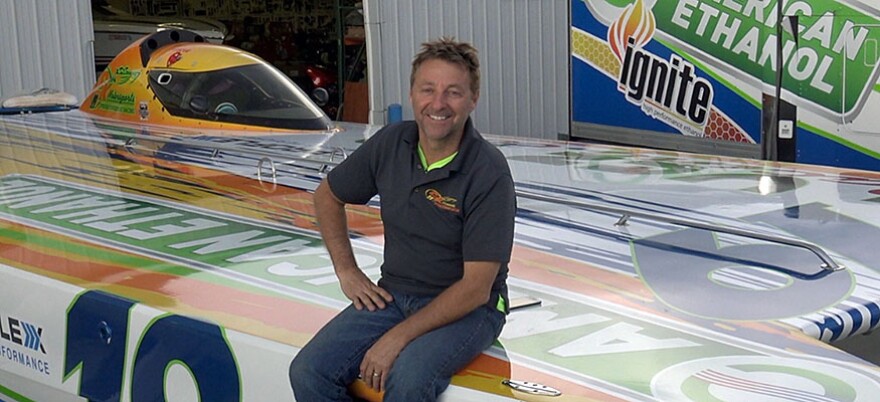(Please note: My interview with Cpt. Keith Holmes aired on WJR 760 AM—Detroit just hours after the iconic power boat racer died following a crash July 30 during the St. Clair River Classic Offshore Powerboat Association race. Out of respect for his family, I decided to wait before posting the interview. I had never met Keith previously, but it was clear from just one conversation that he was a gracious gentleman, a passionate competitor, a strong advocate for family farms and an ardent Great Lakes environmentalist. Russ White and I extend our heartfelt sympathy to Keith’s family.)
Captain Keith Holmes is the owner and throttle-man of the 40-foot, offshore racing catamaran, Cat Can Do. A veteran of over 160 races, Holmes has become a legend not only among power boat devotees, but even NASCAR racing drivers and fans.
Holmes has also been bold and green when it comes to racing innovations—a case in point his decision to switch from conventional racing fuel to ethanol in 2014.
“Historically, we have not been as well financed as some of our competitors,” Holmes explained. “We were trying to find an edge, and the first thing we liked about ethanol was the price compared to the fuel we were using.”
Intrigued by the potential fuel cost savings and other benefits he had heard about ethanol, Holmes did extensive research, communicating with several ethanol experts, then decided to test the fuel.
Holmes, who also owns CK Motorsports in Nunica, is exceptionally well-versed when it comes to marine engines, and it did not take him and his team long to realize that ethanol provided advantages well beyond price—advantages that would make him even more competitive on the water.
“We substantially increased our horsepower and torque. Our engines ran much cooler, and our engine longevity went from four or five races to 14 races—no small thing considering these engines cost over $125,000 apiece.”
Holmes became the first person in offshore powerboat racing to burn ethanol—powering Cat Can Do’s two, 1700 hp engines at speeds up to 200 mph.
But Holmes’ commitment to ethanol extends well beyond racing. One of his key sponsors is the ethanol industry—and that means he is also promoting agriculture. “It has been a great joy to be associated with corn farmers over the years and to help dispel some of the myths associated with ethanol.”
Despite what Holmes calls “scare tactics from the petroleum industry,” the E-10 fuels “are entirely safe for your marine engines and are fully warrantied by all the major engine manufacturers.”
And, then, perhaps most importantly for Holmes, there are the environmental benefits of using ethanol in marine engines. “We have reduced our carbon emissions by almost 100%,” he says. “We drink and swim in Lake Michigan water, and we eat the fish. Our Great Lakes are a treasure, and we must do all we can to protect them.”
Greening of the Great Lakes airs inside MSU Today Sundays at 4 p.m. on 94.5 FM and AM 870.

